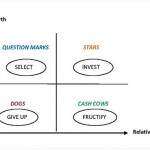The roots of Marketing Performance Management – An investigation in the context of its emergence
Literature reveals that the influence of Marketing on firm performance, especially on the bottom line, has been extensively explored, mainly from a resource-based view (RBV) perspective (Hooley et al. 2005; Fine 2009; Nath, Nachiappan & Ramanathan 2010). It seems natural to estimate that Marketing (no matter its forms: Market Research, Marketing mix etc.), as long as it generates sales, impacts in a positive manner the bottom line.
Moreover, there have been attempts to prove that customer satisfaction influences the stock prices, although economists and analysts commonly make limited use of this kind of data when projecting stock performance, and suggest firms should report forward-looking customer metrics (customer equity statement) (Fine 2009), because financial indicators have a lagging, not a leading perspective.
The fundamentals for measuring Marketing results are therefore thought to rely on the very specific nature of Marketing as an organizational function. Just like the Human Resources function, Marketing was long considered to be a consumer of organizational resources, mainly financial, that wasn’t able to prove the worthiness of that consumption. David Reibstein from Wharton Business School, Jason Pashko from Accenture and Jeff Levitan from SAS discuss this issue in a webcast in 2007, arguing the replacement of “old age marketers”, that wanted to be left alone, stating that their activity was all about creativity and not agreeing with budget accountability with “new age marketers” that in order to be controllers and investors of assets present results in shape of metrics to prove they do their job well. One trigger that enhanced the extended use of performance measurement in Marketing was the development of technology and new business models that allow organizations to capture much more data on the market (Reibstein, Pashko & Levitan 2007).
Another context, besides that of accountability, mentioning the measurement of Marketing performance was the one dealing with improvement of Marketing practices and processes. Such a context can be found in a benchmarking initiative of the Marketing process. The benchmarking process is described by experts as a multistage approach, commonly consisting of the following three levels: identification of the best performers, setting the benchmarking goals and implementing changes. Performance measurement of Marketing appears in the second and the third stages: in order to set benchmarking goals, companies measure their own productivity against productivity of the leaders and during implementation, companies use indicators to track the progress in reaching the benchmarking goals (Donthu et al. 2005).
It is argued that commonly, a benchmarking tool needs to be focused on a single measure of overall efficiency or productivity that can be computed for the firm and compared with competitors. However, a more robust approach is by analyzing multiple inputs and multiple outputs that can provide feedback regarding areas with need for improvement (Donthu et al. 2005). For example, if the overall benchmarking measure would be the level of customer satisfaction with complaints handling, several inputs and outputs to be analyzed in this context would be the following:
- # Time to resolve customer complaints (output),
- # Investment in customer support infrastructure (input),
- # Customer support staff (input),
- # Complaints backlog (output),
- % Times where customers with handled complaints were courteously recalled (output) etc.
The belief that Marketing influences firm performance and recent Marketing developments impose raised Marketing accountability and continuous improvement of the Marketing capabilities. Marketing Performance Management (MPM) has emerged as a new area of Marketing to deal with “measuring, learning from, and improving upon marketing strategies and tactics over time” (CMG Partners & Chadwick Martin Bailey 2009).
References- CMG Partners & Chadvick Martin Bailey 2009, The Marketing Performance Advantage. Improving Effectiveness and Accountability
- Donthu, N, Hershberger, EK & Osmonbekov, T 2005, ‘Benchmarking marketing productivity using data envelopment analysis,’ Journal of Business Research, vol. 58, pp. 1474– 1482
- Fine, LM 2009, ‘The bottom line: Marketing and firm performance,’ Business Horizons, vol. 52, pp. 209-214
- Hooley, GJ, Greenley, GE, Cadogan, JW & Fahy, J 2005, ‘The performance impact of marketing resources,’ Journal of Business Research, vol. 58, pp. 18– 27
- Nath, P, Nacchiapan, S & Ramanathan, R 2010, ‘The impact of marketing capability, operations capability and diversification strategy on performance: A resource-based view,’ Industrial Marketing Management, vol. 39, pp. 307-329
- Reibstein, D, Pashko, J & Levitan, J 2007, Marketing Performance Management: The Key to Accountability webcast

Tags: Benchmarking, Marketing performance, Resource-Based View, Theory






